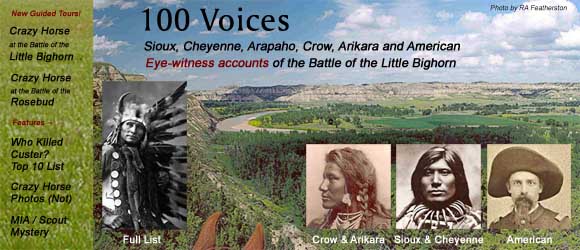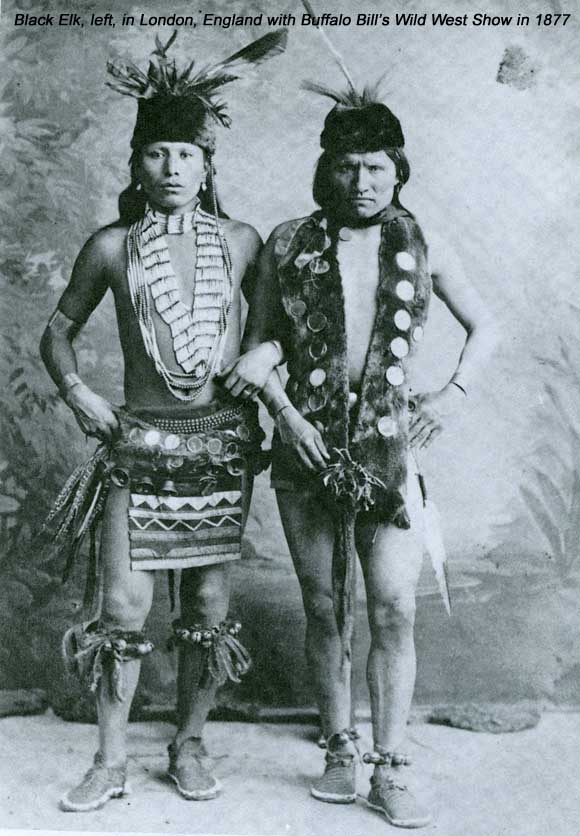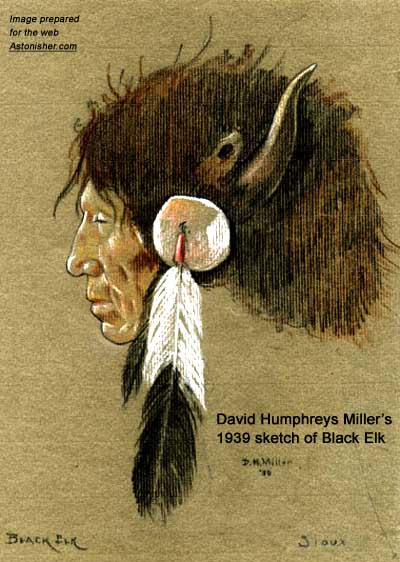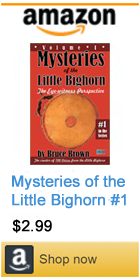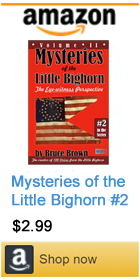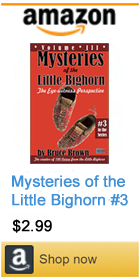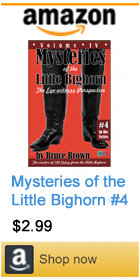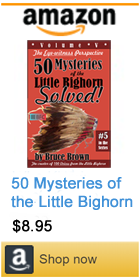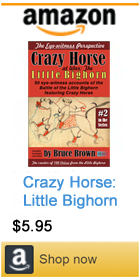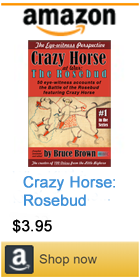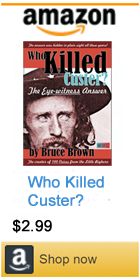|
|||||||
Bruce Brown's 100 Voices... Black Elk's Story of the Battle, #2
BLACK ELK TELLS ABOUT THE CUSTER BATTLE AT DAYBREAK my father woke me up and told me to go with him to take the horses out to graze. A cousin of mine and I were getting ready to take several tipis' horses out to graze. Then as I started my father told me to be careful and I ought to have one horse with a long rope on it, easy to catch, and we should keep our eyes on the camp and look around us always. He said, "If anything happens bring horses back to camp right away as soon as you can." We took the horses out and herded them as the sun was coming out. We stood out there until the sun came up higher. We just let the horses go and I tied a long rope to one of them and turned them all loose. We went back to the camp. It was getting warm now and so the people were all swimming in the river. Some men went out hunting and women were out digging turnips and it was about eight or nine o'clock. We had no breakfast and had to go back to get it. Everyone took his horses to water. I did not feel right -- I had a funny feeling all this time, because I thought that in an hour or so something terrible might happen. The boys were all swimming and I did not go down because I did not feel very good. I made up my mind I would go swimming anyway, so I greased up my body. At the Hunkpapas I heard the crier saying: "They are charging, the chargers are coming. Where the tipi is they say the chargers are coming." (The tipi where they had put their dead before when they came down to the Greasy Grass.) Then the crier at the Oglalas announced it and then each village announced it one after the other. We heard the cry going from village to village. Just about this time my cousin had taken the horses to water and they were then just coming from the water. I had a buckskin mare and got her. Everyone was catching their horses at this time. We were lucky to get our horses-most of the peoples' horses were out grazing yet and they were running after them. My older brother had a sorrel which he bridled and saddled. My father said: "Your brother has gone to the Hunkpapas. You had better take this gun over to him." I got on my horse and as I went I could see the dust flying as I took the buckskin to my brother. When the dust parted, I could see the soldiers. These men looked big and husky and tall. Just then they began to shoot. The Hunkpapas began to retreat on foot and at this time there were lots of people swimming. I could see the little ones all naked running from the river. As I saw this all I wanted was to find my brother. Just then I saw him. The announcer cried that there was a boy who had gotten killed out there somewhere. My brother came up and took hold of his horse and told me to go on back, but 1 had a six-shooter with me, which my sister had given me; and I had given my brother his gun. There was a woods on the other side of the Hunkpapas. All the men got together and gathered in front of the woods. My brother hit for the brush. He told me to turn back, but I took after him. When I got to the timber the soldiers were shooting above us and you could see the leaves falling down off the trees where the bullets struck. I went in there and after that I did not know what happened back of me. We got under the brush little by little and we crossed the flat and the soldiers began to shoot at us and all we heard was: "Take courage, don't be like a woman." Some of them said: "Take courage, the helpless are out of their breath." The women were running to the hills. Little bunches at a time began to cross the flat. I was underneath in the brush and I did not quite notice what happened above me. I stood there under the trees and recalled my vision there again and it made me feel stronger. Then I thought that my people in my vision had been Thunder-beings, but I didn't see why the soldiers should be doing this. I thought then that perhaps the people had used some of my power because I knew that we were going to wipe out the soldiers. Close after the crying about courage we heard that Crazy Horse was I coming. He was riding a white-faced horse. Everyone hollered: "Crazy Horse is coming!" Just then I heard the bunch on the hillside to the west crying: "Hokahey!" and making the tremolo. We heard also the eagle bone whistles. I knew from this shouting that the Indians were coming for I could hear the thunder of the ponies charging. A little above us I could hear the hoofs of the soldiers' horses that went down into the brush. Then after a little while they [the soldiers] went back up again and I followed after them. It was a bad mixture then-soldiers, then Indians, etc. I could see nothing much but I heard shots and voices. We all hollered at each other: "Hurry, hurry!" The soldiers were running by this time up the stream-soldiers and Indians mixed up. Just then I could see a Sioux charge at one of the soldiers and try to get ahold of his horse and the soldier shot the Sioux off his horse with a revolver he had. Then I saw that this white man had shot two of the Indians at that time. (This white man was named Captain [Thomas H.] French.) Before we knew it, the soldiers were firing on us and the women and children were fleeing for their lives. Then the Indians were mad and it was hard to check them -- they were plum crazy. We followed [Maj. Marcus A.] Reno's retreat. Then when we got up the creek a little ways we went into the river-three of us boys about the same age together. I noticed a six-shooter so I got off and picked it up. Everyone was weaving in and out-that was really all I could see. I was very small and I had no chance to shoot anyone. There were a lot of Indians ahead of me. We stopped on a flat and everyone would get a soldier and strip him and put on his clothes for himself. We took everything they had-pistols, guns, ammunition, etc. We went to the river and turned back from there. As we turned from the river we saw a kicking soldier and a man came up and said: "Boy, get off and scalp him." So I got off and began to take my knife. Of course the soldier had short hair so I started to cut it off. Probably it hurt him because he began to grind his teeth. After I did this I took my pistol out and shot him in the forehead. This was down by the river where we jumped in.
Brothers-in-law, now your friends have come. Take courage. When I got back to my mother, men were bringing soldiers' horses and scalps. As I came back home I saw this wounded man whom we had cured, and he had a gun and was watching the fight. He was singing a Fox song in the Oglala village. [He had a Fox lance in front of him and] he was singing a song of regret that he was not able to fight. The song was like this: Friends, what you are doing, I cannot do. I heard this man singing this as I passed by going to my mother. I stood there awhile and watched the fight. Pahuska Gasot(h)ah [Pehin Hanska kasota], "Rubbing out of Custer [Long Hair]" [the Lakota name for the battle of the Little Big Horn]. The Sixth Grandfather: Black Elk's Teachings Given to John G. Neihardt, edited by Raymond J. DeMalle, University of Nebraska Press, Lincoln, NE, 1985 p 180 - 184
Black Elk was Crazy Horse's cousin. Although Black Elk was only 13, he took two scalps in the Battle of the Little Bighorn. Black Elk surrendered with Crazy Horse's band at Ft. Robinson in May 1877. Here is another account of the battle by Black Elk. |
|||||||



